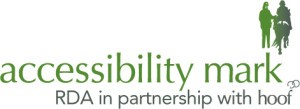Posted: 19th September 2016 | Back to news feed

Accessibility Mark is a scheme helping to provide more riding opportunities for disabled people. Here we talk to Sally Hall of Urchinwood Manor to find out why they went for accreditation and how it could benefit other centres.
Riding for the Disabled Association (RDA), in partnership with Hoof, the British Equestrian Federation’s (BEF) participation programme launched the revolutionary Accessibility Mark scheme with the aim of getting more disabled people to participate in riding.
Primarily aimed at centres approved by the British Horse Society (BHS), the Association of British Riding Schools (ABRS) and the Pony Club (TPC), it is the responsibility of the individual centre to decide upon a suitable level of involvement for themselves depending on individual circumstances. Therefore, the specific types of disabilities that can be catered for varies from centre to centre.
The scheme is underpinned by the RDA, drawing on their extensive expertise in this area in order to provide riding schools with appropriate training and support.
Urchinwood Manor based in Bristol is one of 34 centres that have gained Accessibility Mark accreditation, with the scheme proving to be a huge success. The centre holds several sessions throughout the week, both group and individual lessons, catering for between 30 and 40 riders per week.
Sally and Peter Hall have run Urchinwood Manor since 1979 and constantly strive to improve the standard of service they provide. As they were already catering for disabled riders the Accessibility Mark accreditation provided Urchinwood Manor with the opportunity to gain a stamp of approval from a recognised organisation as well as tap into the experience of the RDA.
Sally praised the credibility that the scheme brings to their centre and its staff: “RDA is a wonderful organisation with such high standards, and Accessibility Mark means we can demonstrate to our clients that we too can provide a service to match that of RDA.
“If I was looking to attend a centre, I would feel confident to go somewhere where the standards were checked and the staff highly trained.”
As well as running Urchinwood Manor, Sally is also an Accessibility Support Officer (ASO), this role involves taking centres through the accreditation process and providing follow-up support.
“Initially the ASO visits a centre to get to know them and check all their relevant paperwork, such as insurance and risk assessment procedures. We look at their facilities, staffing levels and of course the horses and offer advice on what is actually required to meet the criteria.
“It’s really important that the centres don’t see this as an inspection, more a chance for us to help them through the process,” added Sally.
The next stage of gaining accreditation is a training day carried out by the ASO, focusing on demonstrating recognised techniques to deal with the challenges faced by disabled riders. From a safety point of view, mounting and dismounting is one of the biggest issues that centres have to deal with.
“Our aim is to always find a way to make it possible, which is often a real team effort.”
The training is not just about the practical aspect of catering for disabled riders, as Accessibility Mark also caters for riders with learning difficulties, so emphasis is also placed on communication during training, teaching the staff how to effectively converse with people who have difficulties in this area.

The riders that enjoy the Accessibility Mark sessions at Urchinwood Manor have varying levels of riding ability with some just being content to go for a hack on a lead rope, while others have ambitions of competing to a high level, possibly even Paralympic.
Urchinwood Manor also introduced their own certificate of achievement programme, to reward clients when they reach their own, personally set goals.
One of Sally’s most rewarding experiences was working with a blind gentleman who was initially so nervous she held his hand, through perseverance he has gained the confidence to walk, trot, canter and even venture out on a hack.
Not only does horse riding produce positive physical benefits, it also involves an enhanced physiological advantage through the relationship between horse and rider and also through the social aspect of meeting new people.
If you know or are involved with a riding centre, here are a few great reasons for it to become involved with Accessibility Mark and gain accreditation:
Reasons for a Riding Centre to gain Accessibility Mark accreditation:
• Accessibility Mark provides a new avenue for disabled people to access sport and activities in their local area.
• Accessibility Mark offers the chance to welcome new clients.
• The centre will benefit from a wealth of experience from RDA qualified staff; this valuable knowledge has been acquired over the 40 years that RDA has been offering life-changing activities to people with disabilities.
• RDA will provide access to training and support to enable staff to be confident they can provide an outstanding service to both existing and new riders.
• Gaining accreditation allows centres to meet the demand for equestrian activities among disabled people in the local community.
For information on how to become an Accessibility Mark centre contact Jo Hayward at RDA at jhayward@rda.org.uk or call 01926 492915. To find your nearest RDA Group or Accessibility Mark centre visit www.rda.org.uk.
The Equestrian Index newsfeed is compiled from articles submitted by advertising members and expresses the opinions of those members. Watsons Directories Ltd shall not be held liable for any inaccuracies or mis-statements therein.